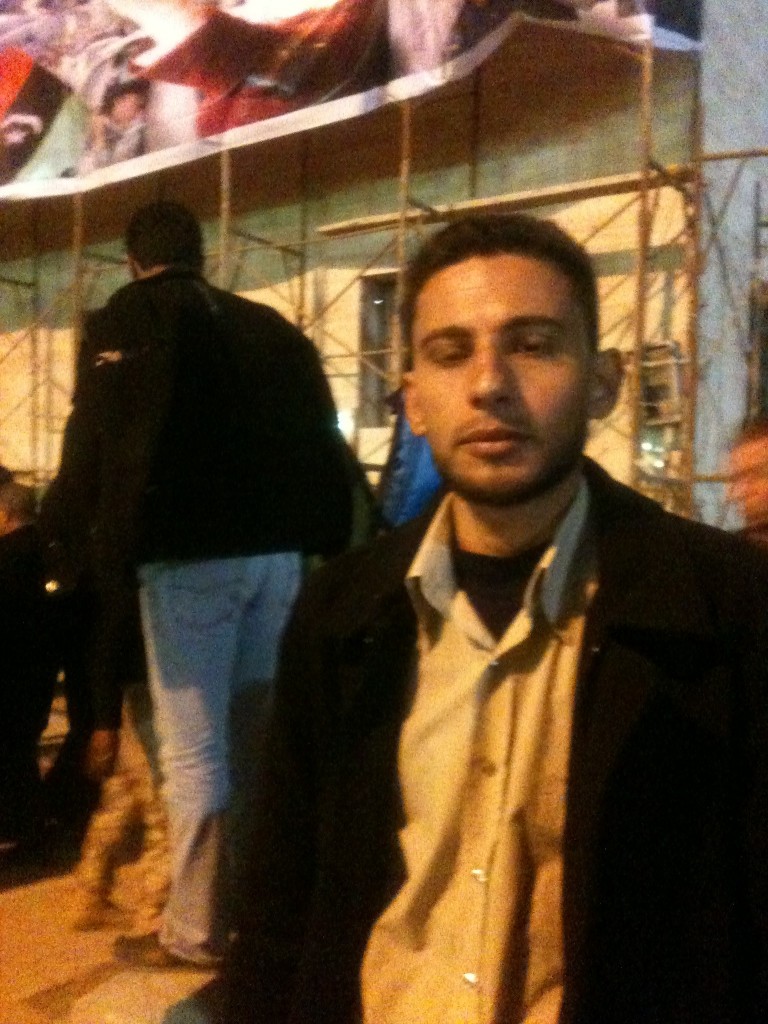By Houda Mzioudet.

Benghazi, 17 February 2013:
Thousands of people converged on Freedom Square in downtown Benghazi to celebrate the second anniversary of the . . .[restrict]start of the uprising in the eastern city. The electric atmosphere of triumphant shouting, horn-honking, singing, music, dancing and fireworks, did not hide the visible disappointment and resentment of some who came to watch but stayed aloof from the crowd.
“I have no reason to celebrate. The revolution has not fulfilled its goals yet,” said Jaber Al-Majbari, a young activist who does casual work. With some bitterness, he continued, “A lot has not been done for Benghazi and the whole of the eastern region to give it fair and equal treatment as the west of the country. Corruption is rife and stronger than before. We still have to travel to Tripoli to get some documents signed there, because of this persistent centralisation of powers.”
Majbari said he had been on a hunger strike for 35 days from May to June 2012 in protest at the unfair distribution of seats for eastern Libya in the General National Congress, elected in July 2012.
“I used to be a federalist during the revolution. I am now a confederalist. I now support the independence of the province of Cyrenaica from the rest of Libya. This will end this marginalisation for good. They (people in the GNC) are still applying Qaddafi’s laws on us. After all the sacrifices during the revolution for Libya, their fake promises for justice, we only get the little crumbs of our own riches. The option of total separation is inevitable for me,” Majbari continued in an angry tone.
Of the methods that people could use to get their goals achieved, Mejbari insisted on the use of civil disobedience.
“We will declare civil disobedience and we will give the government in Tripoli a deadline of March 30 to have our demands all met of more decentralisation,” he added.
He said that he would consider leaving the country if nothing happens to restore what he believed was justice to the province of Cyrenaica.
Majbari’s frustration was echoed by other Benghazi locals especially young people who actively participated in the revolution. Ahmed Tashani, who works in the communication sector, is also a proponent of federalism to restore equal rights to the eastern region. He however does not call for the independence of Cyrenaica from Libya.
His views are at the extreme end of the federalist debate and did not appear in tune with those of the board mass of people at the demonstration. However it reflects the strong willingness of a lot of Benghazi residents to continue their “struggle” to remedy past wrongs and what they see as systematic marginalisation of their region since the fall of Qaddafi.
Alya Barghathi, a young university lecturer in Benghazi who prides herself on her family’s long opposition to the Qaddafi’s regime, including her father’s imprisonment, reiterated her support for decentralisation and autonomy for Cyrenaica. She said she regretted that people in and outside Libya think of the federalists’ demands as a desire for independence. Her younger sister Selma insisted on the constitutionalisation of federalism was a popular demand that needed no discussion.
Celebrations went on smoothly all night, with tight security all over the city.
Tomorrow, Sunday, the President of the GNC, Mohamed Magarief, and Prime Minister Ali Zeidan are due to attend official celebrations of the Libyan Revolution in Benghazi rather than Tripoli.
[/restrict]







